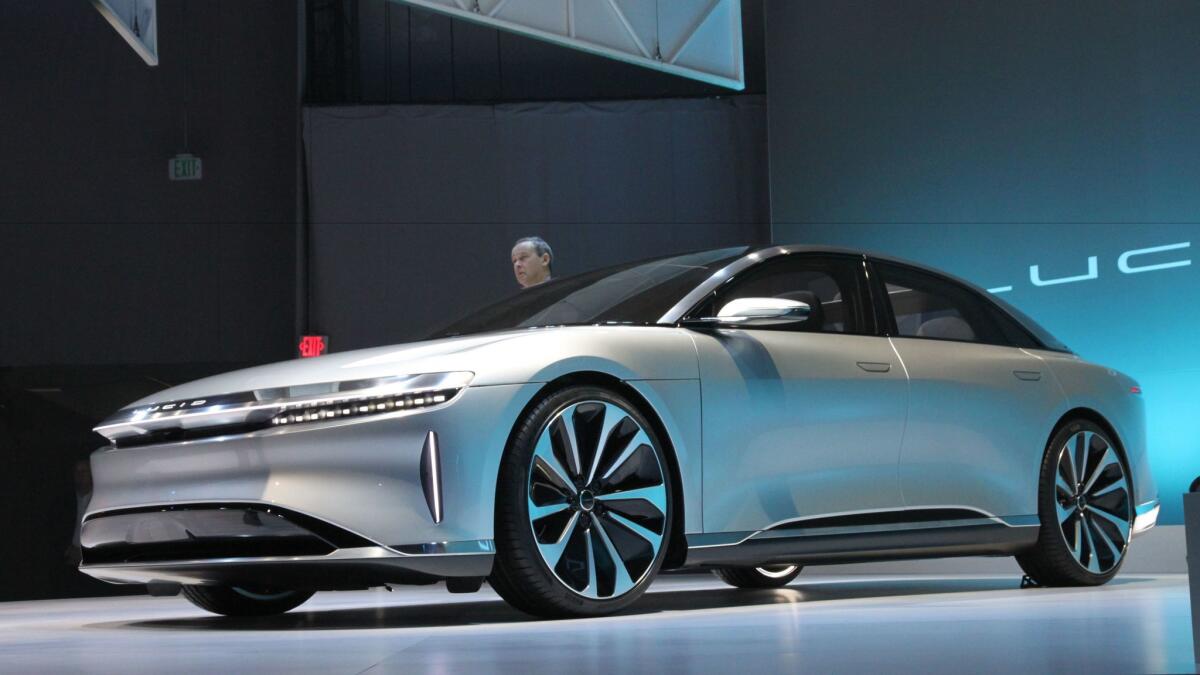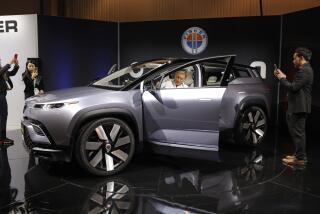Lucid takes the wraps off its electric luxe-mobile

Reporting from San Francisco — If you’re looking for a 1,000-horsepower luxury electric car that pops from zero to 60 in 2.5 seconds and runs 300 miles between charges, is equipped with autonomous driving technology and plenty of legroom, the Lucid Air might be it.
The veil was lifted on a production version of the vehicle by new Silicon Valley carmaker Lucid on Wednesday.
It’s a sleek vehicle described by the start-up’s design chief, Derek Jenkins, as “a world-class sports car, a sublime luxury car and the perfect commuting tool” rolled into one.
Electric cars represent less than 1% of the U.S. market, but with its Model S sedan and Model X sport utility vehicle, Tesla proved that there’s an enthusiastic customer base on the high end. And of course the U.S. is not the only car market. Electric car growth in China is strong, riding on government mandates and incentives. Lucid sees a big market there.
The Lucid Air would seem to go up directly against the Tesla Model S, and it does – sort of.
But restricting the competition to electric cars distorts the real market opportunity, said Peter Rawlinson, Lucid’s chief technology officer and former chief engineer on the Model S.
“We’re competing in the worldwide luxury car market,” he said.
That segment is dominated by gasoline and diesel cars from Audi, BMW and Mercedes-Benz. (Those three are developing electrics too.)
Lower and narrower than those cars, the Lucid boasts the legroom of an S-class Mercedes but with the outside dimensions of the smaller E class. The better to move through tight urban spaces while enhancing a luxury experience inside, Jenkins said.
Electric cars allow more legroom than an internal combustion car — gas and diesel engines are big. Lucid worked with the form of the battery packs and tightened up the dimensions of the electric motors and transmission to expand the interior as much as possible. The steeply reclining rear seats in particular were designed with business class aircraft seats in mind.
The ideal customer, Rawlinson said, is “the environmentally conscious chairman of the board.”
If plans are met, about 10,000 Airs will be produced by the end of 2018, with eventual full production at about 60,000 a year, a Lucid spokesman said.
The Air will be aggressively priced. The company plans to charge a base price of about $65,000 at full production but said early versions would be more expensive.
The Menlo Park company is funded by the Venrock venture capital firm and by Chinese investors including Jia Yueting.
Jia, a controversial Chinese technology entrepreneur, is also investing in troubled Faraday Future, the Gardena company that’s developing its own electric luxury car. Jia has struggled to raise cash lately, and construction work has ceased at Faraday’s North Las Vegas manufacturing site until the company catches up on tens of millions of dollars in past-due bills to its lead contractor, L.A.-based Aecom.
Lucid’s finances are solid, Rawlinson insists. “We’re a completely different company.”
Assuming all goes smoothly, Lucid plans to manufacture the car in Arizona and start selling it in the U.S. by late 2018. Next up is China.
Twitter: @russ1mitchell







